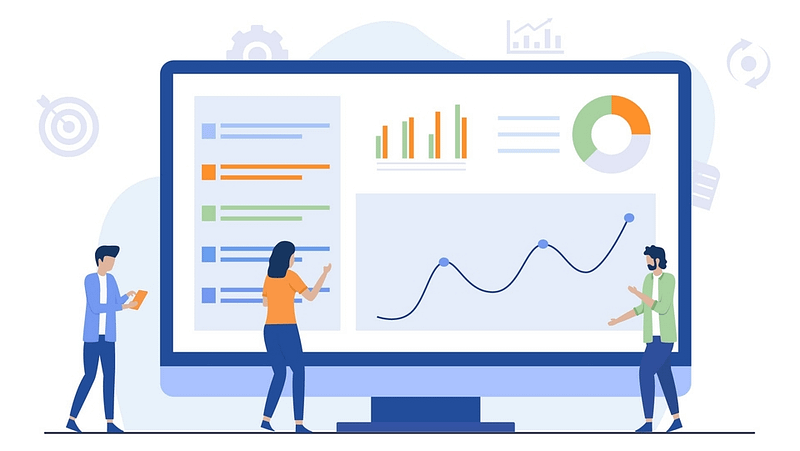Management software simplifies and automates all business processes-it is an indispensable solution for any company. But what are the aspects to consider when choosing the best business management software?
In this article we tell you about 8 essential aspects in choosing a management software for your business.
8 aspects for choosing the best business management
First of all, let's start by saying that there is no absolute best management software on the market, as every company has different needs.
The eight aspects we discuss when choosing a business management are:
- customization,
- The integrated management of business processes,
- Integration with other software,
- data security,
- The traceability of operations,
- The multiplatform and multi-user software,
- the simplicity of use
- The choice of a reliable supplier.
Let's start by looking at them together.
1. Customizable to your company's needs
The first factor to take into account when choosing the best business management system is customization.
Very often this element is underestimated, but it is of fundamental importance: every business has unique characteristics and business structures, and technology must serve these characteristics.
It is not the company that must adapt to the software, but the software that must meet the needs of the company.
Management software acquires its value only when it meets all the specific needs of the company, not just standard procedures such as accounting.
He then opts for a management system:
- Customizable, able to adapt to your needs and organizational processes;
- Scalable, able to adapt to business growth and change quickly and easily;
- Accessible on different platforms (computers, tablets, smartphones), interoperable with each other;
- Modular, capable of dividing information flows into subfunctions (or packages of functions) so that they can be combined according to individual needs.
2. Integrated management of all business processes: ERP
An excellent business management system must ensure the optimization of all organizational processes, so it must contain multiple related procedures.
Opting for "departmental" software-that is, each software deals with a business area-is no longer functional, as only the integration of all processes enables effective business management.
Integration allows all business processes to communicate: accounting, financial management, sales, purchasing, inventory management, production, service and support, agents, CRM, calendaring, and electronic invoicing.
Choosing an ERP management system (Enterprise Resource Planning), a scalable and modular solution, enables coordination of all areas of an enterprise, including:
- Financial and accounting control and management: primanota, schedules, vat settlements, financial analysis
- Sales and purchasing management: complete active and passive cycle with invoicing
- Inventory Control and Management
- Job Management
- Control and Management agents and technicians
- Production management
- Technical assistance management and services
3. Can be integrated with other software
Also to be considered when choosing management software is the possibility of integrating it with other software or modules.
For example. CRM software for effective contact management or business intelligence for analyzing all company data. In fact, today all areas of a company are computerized, from human resources to the production department to the sales department.
Therefore, it is essential to have a management system that allows you to keep up with the company's growth, and that allows you to integrate different procedures: ecommerce sites, advanced financial control procedures, automatic warehouse handling, specific software for production management.
This is effective in terms of productivity and is a forward-looking choice that prevents problems that overly rigid management can create.
The solutions that offer the most flexibility are those that are modular-such as an ERP-that allow the management system to be customized with the functions that best meet the company's needs.
4. Data security
The best business management is the one that protects business data.
Security is a key issue online, and data are a treasure trove for any business, as they help in analyzing business performance and allow decisions to be guided. They must therefore be managed properly.
Management software contains sensitive data: from internal business data such as costs, price lists, invoices, budgets, and banks, to customer and supplier data, production procedures, and more.
Losing them or putting them at risk leads to not insignificant problems both in terms of productivity and in legal terms.
So pay close attention and choose a solution that ensures the security of the data contained, in line with GDPR guidelines.
5. Traceability of all operations
Among the aspects to consider when choosing the best business management system is the traceability of all transactions.
In fact, it is essential to control every aspect related to each activity: who is to perform it, how it is to be performed, and when the deadline is.
This way you keep track of each phase of an investment project, detect deviations from plans, and check for critical issues so that you can intervene as soon as possible, in the most appropriate and timely manner.
This can be done by integrating the management system with workflow software, which allows the flow of activities to be structured by indicating the users who are to carry them out.
6. Multiplatform and multi-user
As we have already seen, it is important for management to be accessible, and therefore multiplatform and multi-user.
It must ensure operation on different operating systems and devices, from computers to tablets to smartphones, allowing multiple users to be able to access it simultaneously.
This allows data (financial, profitability, market, current and historical) to be shared across multiple devices and locations, easily and dynamically, having it available at all times for any need.
This will enable you to know the performance of your enterprise at all times.
7. Intuitive and easy to use
Today it is neither functional nor thinkable to invest time, money and resources to work with software that is rigid and cumbersome to manage.
The pace of work is getting tighter and tighter, and it is important that technology facilitates work activities without complicating or slowing them down.
Therefore, intuitive and easy-to-use management solutions should be chosen, i.e., usable, requiring little training time and enabling better use of the program itself.
It is important that the software ensures constant updates in technology, graphics, and ease of use.
8. Reliable supplier
The last aspect to evaluate when choosing the best business management system is the experience and reliability of the vendor.
An ERP software, in fact, is not a static solution but a moving project: it is essential that there is a structure of professionals capable of guaranteeing solidity and continuity.
Relying on a solid company allows you to have software developed and supported for a long time, quick and timely updates, technical and functional skills of programmers, technical and management experts who have gained experience in the field and over years, dealing with many different clients and realities.
Customized management solutions by DueEsseTi
DueEsseTi offers customized management solutions based on two main platforms: the Target Cross and Odoo management systems.
Both solutions offer versatility and can be tailored to the specific needs of each business. Target Cross is known for its robustness and adaptability in diverse business environments, while Odoo offers an open source platform with broad modularity, allowing you to customize and scale features according to the evolving needs of your business.
These systems are designed to optimize business processes, increase operational efficiency, and improve asset management, ensuring that businesses can make the most of their management capabilities.
Choose a customized, integrable, cross-platform management system
Contact us for a personalized demo of our ERP solutions.



